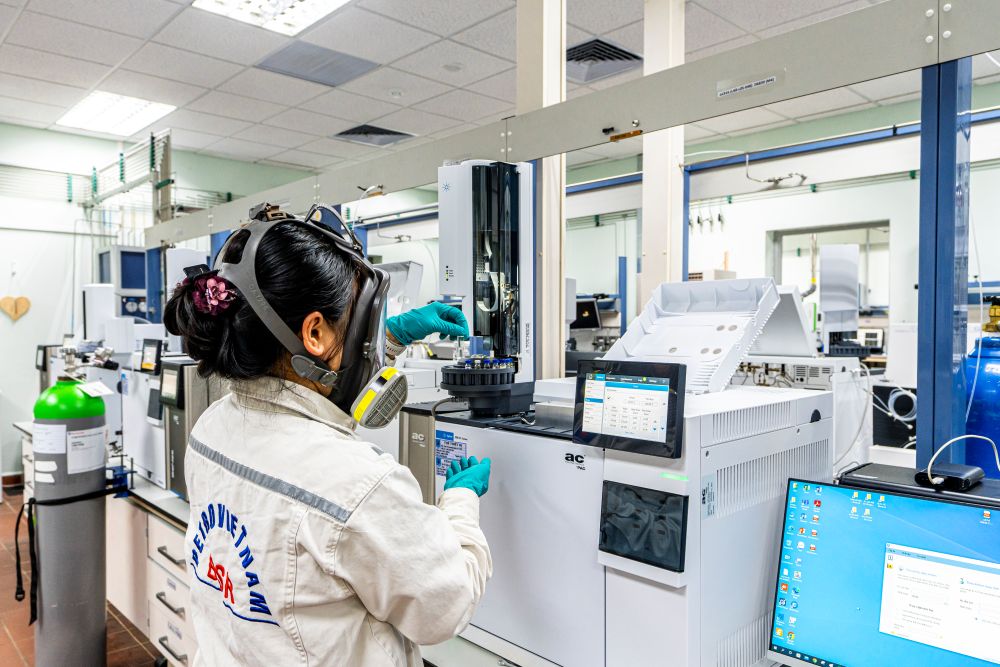Binh Son Refining and Petrochemical Joint Stock Company (BSR), code VILAS 456, effective until 2030. This is an international standard for testing room capacity and standards, affirming that BSR fully meets the requirements for a quality management system and the reliability of test results.
Notably, the BSR Experimental Department was granted VILAS 456 certification by the BoA for the first time since 2010, and has continuously maintained and expanded the scope of recognition through periodic assessments.

According to the recognition decision, BSR Experimental Department is allowed to conduct 67 tests in the field of petrochemical refining, including gasoline, diesel, aviation fuel, LPG, crude oil, etc. In particular, the scope of recognition is expanded to new products such as PP plastic granules, biofuel products (E10, B5, B10) and sustainable aviation fuel SAF (Sustainable Aviation Fuel) - BSR's strategic product line in the trend of reducing global emissions.
In the context of the Government implementing a roadmap for using E10 biofuel and B5 biofuel and B10 biofuel to reduce emissions and protect the environment, while promoting the research and application of Sustainable Aviation Fuel - SAF, the BSR Experimental Department meeting ISO/IEC 17025:2017 standards is of special significance.
First, the department will ensure the quality of biofuel and SAF, these products require strict control of chemical composition, oxidative stability, impurities and safety indicators. With a wide scope of recognition, BSR is completely proactive in evaluating these parameters right at Dung Quat Oil Refinery.
In addition, the international standard inspection capacity helps BSR meet legal requirements, while creating confidence for the market in the process of transitioning to green energy and developing sustainable aviation fuel.
Mr. Pham Cong Nguyen - Head of the Quality Safety Department - emphasized: ISO/IEC 17025:2017 is the foundation for BSR to control the quality of biofuels and sustainable fuels, accompanying the Government in its sustainable development strategy and international integration. Compliance with ISO/IEC 17025:2017 standards will help BSR save costs and time when not having to send samples outside; Proactively control product quality, meet legal and customer requirements; Increase reputation and integrate internationally, facilitate exports and expand domestic and international technical cooperation".
To ensure the laboratory management system operates effectively and is constantly improved, the BSR Quality Safety Committee has implemented many key activities such as Training and assessing the capacity of engineers and analysts. Every year, hundreds of internal training sessions are organized and employees are assessed for testing capacity. In 2025 alone, 1,125 experimental capacity assessments and more than 100 OJT training sessions were conducted over 89 analysis targets, ensuring that human resources mastered the analysis equipment and methods.
In addition, the Experimental Department has actively implemented thousands of periodic inspections to maintain the accuracy and stability of the equipment. In 2025, 8,099 inspections, certification and maintenance of analysis equipment were recorded, ensuring that the equipment is always ready for analysis.
BSR Experimental Department also participates in national and international proficient testing programs to compare internships and improve the reliability of results. In 2025, the Board participated in 11 successful test samples with hundreds of targets, achieving an excellent Z-score ≤ 2 ratio. At the same time, organized 03 consecutive comparisons with the participation of more than 20 PTN from domestic units, contributing to standardizing methods and improving analytical capacity in the system.
These activities not only ensure the maintenance of ISO/IEC 17025 certification but also improve technical capacity, meeting the requirements of quality control for new products such as E10, B5, B10 and SAF.











